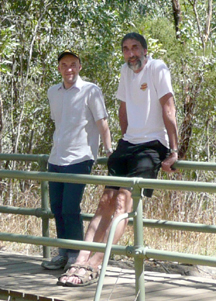 Barry Brook, noted Australian climatologist and SCGI member invited Tom & Nicole Blees to visit Australia for nearly two weeks at the beginning of February. Barry and his staff had arranged a whirlwind tour of four Australian cities that included radio and print interviews, a number of talks to academics, business leaders, and the general public, private talks with leaders of industry, and a debate that was sold out. Noted anti-nuclear campaigner Helen Caldicott was supposed to be one of the debate participants, but a flash flood prevented her from attending at the last minute. Her spot was filled by another antie and the debate went on as scheduled.
Barry Brook, noted Australian climatologist and SCGI member invited Tom & Nicole Blees to visit Australia for nearly two weeks at the beginning of February. Barry and his staff had arranged a whirlwind tour of four Australian cities that included radio and print interviews, a number of talks to academics, business leaders, and the general public, private talks with leaders of industry, and a debate that was sold out. Noted anti-nuclear campaigner Helen Caldicott was supposed to be one of the debate participants, but a flash flood prevented her from attending at the last minute. Her spot was filled by another antie and the debate went on as scheduled.Barry had also arranged for a tour of Australia's only nuclear reactor outside Sydney, where Tom gave a talk and was able to meet with prominent nuclear scientists. There was discussion about Australia participating in upcoming SCGI initiatives despite the country's current lack of support for nuclear power, a situation that is rapidly changing as Barry continues to till the soil there and plant seeds of promise for the future.
The similarities of much of the parts of Australia that Tom and Nicole saw on their trip to their home state of California were clear, and one couldn't help but compare the situation down under to the story of California's Central Valley. Being semi-arid like much of Australia, the valley has become a garden of the USA due to a massive canal and irrigation system. As Australia builds desalination plants to supply their cities, one can easily imagine much of that country achieving a level of agricultural productivity rivaling and even exceeding California's, except for one thing: the water is too expensive because the energy used to desalinate it is supplied by coal. This leads to the strange phenomenon of building big desalination projects with plans to run them only part-time, not because Australia doesn't need the water but because of the cost of that water, having to shovel coal into the system to keep it running.
Ironically, Australia has the largest known reserves of uranium in the world, and nuclear power plants doubling as desalination plants could provide vast amounts of water with little thought for the costs, since they can run 24/7 and fuel costs are negligible. Hopefully Barry's efforts there will bear fruit and brighten the future for Australia. We look forward to more such international interaction among SCGI members as our organization grows and matures.
----------------------------------------------
Here's a link to an extended interview with Tom by Mike Young at the Royal Institute in Adelaide. Mike is a professor at the University of Adelaide specializing in global water issues.
Here is a link for those who wish to hear the podcasts of the debate that featured Barry and Tom vs. two anti-nuclear activists. The format of the debate was four 15-minute talks with a brief rebuttal at the end, followed by a lengthy Q&A with the audience. Barry, Tom, and the moderator had all pressed for an actual moderated debate but Helen and Mark Diesendorf, the two opponents, had refused to participate unless they could deliver speeches complete with PowerPoint presentations. The actual debate occurred during the Q&A, and that's where some sparks flew.
